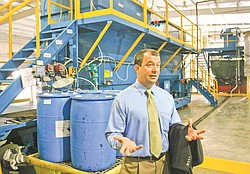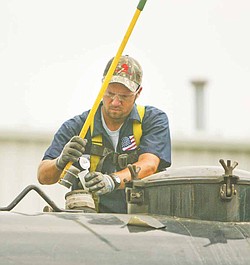Patriot Water Treatment in Warren seeks rescue from state regulation
Andrew Blocksom, president of Patriot Water Treatment in Warren, invited state legislators to the plant Monday to demonstrate how the 6-month-old company treats wastewater.
Joe Allen of Patriot Water Treatment in Warren takes a sample of water from an incoming truck. The water is tested to ensure it meets environmental standards before it is treated by Patriot. Patriot officials are seeking help from state lawmakers to convince the Ohio Department of Natural Resources and the Ohio Environmental Protection Agency to allow the Warren company to continue treating wastewater.
By Karl Henkel
WARREN
One month after an Ohio Department of Natural Resources ruling severely hampered Patriot Water Treatment’s plans for job growth and investment, Andrew Blocksom is still perplexed.
“It’s like telling Lordstown they can build all the cars they want,” said Blocksom, Patriot’s president. “But the cars can’t leave the building.”
ODNR ruled last month that it will revoke the city of Warren’s brine-water permit next year, citing a statute in the Ohio Revised Code that “strictly limits” options for disposing brine from the production of oil or gas.
That’s a blow to Patriot, which transports water it cleans to the city treatment plant, where it is cleaned further.
Blocksom, who met with ODNR officials after he received the notice in late May, hopes the area’s state legislators will help save the company money so it can create more jobs and expand its facilities.
“They’re pulling the rug on the relationship between Patriot and the city of Warren,” said Rep. Ron Gerberry of Austintown, D-59th, one of a handful of legislators who toured the plant Monday. “For Patriot, it’s going to become more costly, because they are going to have to dispose of the refined water somewhere else.”
Chris Abbruzzese, spokesman for the Ohio EPA, said Patriot will have to find other ways to dispose of the pretreated water, such as using it for road surface application or injecting it underground. Blocksom says Patriot treats water not disposed of by other methods and the lack of a permit will effectively shut down the business.
Disposing of brine water directly into surface water (which includes through a publicly owned treatment plant) is not allowed, according to the ODNR.
After reviewing Patriot’s water treatment process, in which incoming water is tested to ensure it has a low salinity of total dissolved-solids before entering the plant, legislators agreed that some action needs to be taken to reverse ODNR’s decision.
“There’s nothing wrong with this facility,” said Rep. Tom Letson of Warren, D-64th. “The [Ohio] EPA has never said that this facility can’t do what this facility does, which is take a product and clean it up.”
Others, such as Gerberry, were upset with the timing, which occurred five months after Patriot’s debut.
“What’s puzzling and concerning to me as a legislator is that we have a company invest millions of dollars, jump through all the hoops, have the whole process set up, and then say, ‘City of Warren, you’re not going to be able to take this [water] after the permit is done.’
“There’s something wrong with that.”
Letson is leading a group of legislators that says it will meet with ODNR Director Scott Nally in coming weeks to brainstorm a conclusion.
In the meantime, Patriot will continue to operate as usual. It cleans about 100,000 gallons of water per weekday, about a third of its potential, Blocksom said.
Patriot already has purchased land in East Liverpool and Steubenville in hopes of building plants similar to the one in Warren. Blocksom said as many as 600 jobs could be created, but only if ODNR allows Patriot to send treated water to public-water treatment plants.
 43
43


